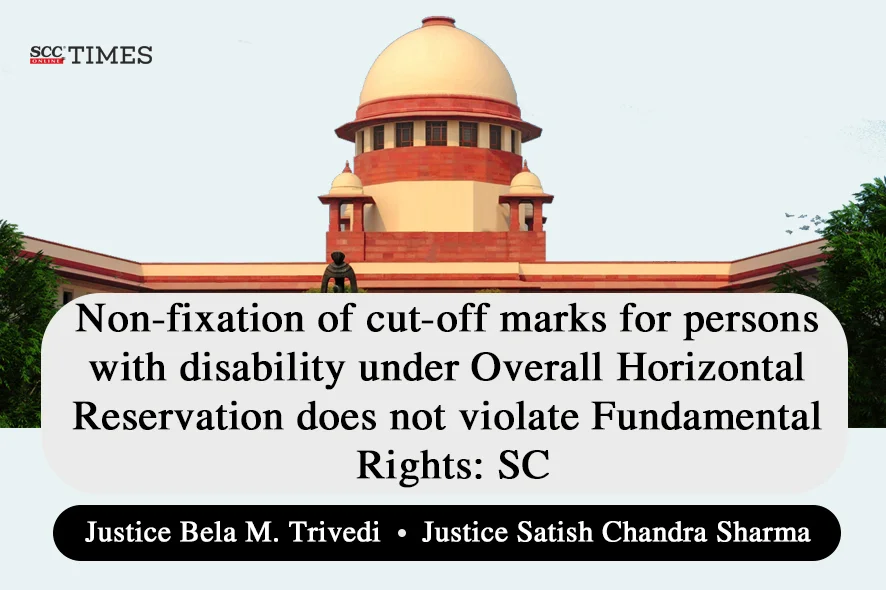Supreme Court: In civil appeals against the Rajasthan High Court for declaring the result of Civil Judge Preliminary Examination showing the cut off marks for each of the categories mentioned in the advertisement in question, and for not showing the cut off marks for the category of Persons with benchmark disabilities, the division bench of Bela M. Trivedi* and Satish Chandra Sharma, JJ. held that the High Court has declared the cut off marks for the persons falling under Compartmentalised Horizontal Reservation and not for the Overall Horizontal Reservation under which the appellants fall. Such action could neither be said to be arbitrary nor violative of Articles 14, 16 and 21 of the Constitution of India. Thus, there is no illegality or infirmity in the impugned judgments and orders passed by the High Court.
Background:
The Rajasthan High Court issued an advertisement for the direct recruitment of 120 posts of Civil Judge and Judicial Magistrate under the Civil Judge Cadre. The appellant, having 40% permanent disability in relation to her eyes, had applied for the said post. The other appellant having locomotor disability i.e. 55% permanent physical impairment in relation to his right upper limb, had also applied for the said post. Both having appeared in the Preliminary Examination were declared “not successful”. As per the result declared on 11-01-2022, the cut off marks in respect of every category mentioned in the advertisement were shown, except the cut off marks for the category of Persons with benchmark disabilities.
Being aggrieved by the said result, the appellant had preferred writ petition which came to be dismissed by the High Court vide the judgment and order dated 02-03-2022. The other appellant had also filed a writ petition which came to be dismissed by the High Court relying upon the judgment dated 02-03-2022 passed in writ petition.
The appellants contended that the High Court while declaring the result of Preliminary Examination showing the cut off marks for each of the categories mentioned in the advertisement in question, had not shown the cut off marks for the category of Persons with benchmark disabilities. According to them, said action was discriminatory and violative of their Fundamental Rights enshrined in Article 14, 16 and 21 of the Constitution of India, and violative of the Rajasthan Judicial Service Rules, 2010 read with Rajasthan Rights of Persons with Disabilities Rules, 2018.
Analysis and Decision:
The Court reiterated that Horizontal Reservation is of two types, (i) Compartmentalised Horizontal Reservation, and (ii) Overall Horizontal Reservation.
The Compartmentalised Horizontal Reservation is such wherein the proportionate vacancies are reserved in each vertical reserved category. However, in the case of Overall Horizontal Reservation, the Reservation is provided on the total post advertised i.e. such reservation is not specific to each vertical category.
The Court noted that appellant has obtained 57 marks in the EWS category for which the cut off marks were 69 marks, and the other appellant have secured 59 marks in the OBC-NCL category for which the cut off marks were 67 marks, were found to be not qualified for appearing in the Main Examination.
The Court noted that as per the advertisement dated 22-07-2021, the vacancies in case of women candidates were classified/identified for each category i.e. General, OBC, SC, ST, MBC whereas for the Persons with benchmark disabilities, no such vacancies were mentioned in the said categories. Further, in the three-tier process of the Examination Scheme, the number of candidates to be admitted to the Main Examination were fifteen times the total number of vacancies (category wise) and the candidates had to qualify themselves by securing the minimum percentage of marks fixed for each of the categories in the Preliminary Examination. Therefore, the Court said that the Persons with benchmark disabilities falling under the Overall Horizontal Reservation had to qualify for the Mains Examination by securing minimum cut off marks fixed for the category concerned in which he/she had applied.
The Court said that apart from the fact that there was nothing provided in the advertisement for the fixation of cut off marks for the Persons with benchmark disabilities, who fall under the Overall Horizontal Reservation, the appellant have also failed to point out from the Rajasthan Judicial Services Rules, 2010 under which the recruitment process was undertaken, that such fixation of cut off marks for the Persons with benchmark disabilities was mandatory.
The Court further added that the notification dated 14-10-2021 issued by the Rajasthan Government was given effect to, in the notification dated 16-04-2024 amending the RJS Rules, 2010, providing relaxation in age and concession of 5% in marks in favour of Persons with benchmark disabilities. None of the said notifications or amendment in the RJS Rules, 2010 make it mandatory on part of the High Court to declare separate cut off marks for the Persons with benchmark disabilities.
The Court said that it cannot be disputed that the Rights of Persons with Disabilities Act, 2016 (‘Act, 2016’) is a social legislation enacted for the benefit of the Persons with disabilities and its provisions must be interpreted in order to enhance its objectives, so that the Persons with disabilities enjoy the right to equality, life with dignity and respect for his or her integrity equally with others as contemplated under the Act. However, there is no such provision either in the Act, 2016 or in the Rules of 2018 framed by the State of Rajasthan, which could be said to have been violated by the High Court by not fixing the cut off marks for the Persons with benchmark disabilities.
The Court underscored that the reservation for the Persons with disabilities has been treated as Horizontal Reservation i.e. the reservation under Clause (1) of Article 16, and not the Vertical reservation i.e. the reservation under Clause (4) of Article 16 of the Constitution of India.
After taking note of Indra Sawhney v. Union of India, 1992 Supp (3) SCC 217 the Court said that there remains no doubt that the reservation for persons with disabilities would be relatable to Clause (1) of Article 16 and the persons selected against this quota will be placed in appropriate category i.e. if he/she belongs to Scheduled Category, he/she will be placed in that category by making necessary adjustments, and if he/she belongs to open category, necessary adjustments will be made in the open category.
The Court also referred to Anil Kumar Gupta v. State of U.P., (1995) 5 SCC 173 , and said that the special reservations cannot be proportionately divided among the Vertical (Social) reservation categories, and the candidates eligible for special reservation categories have to be provided overall seats reserved for them, either by adjusting them against any of the Social/Vertical reservations or otherwise, and thus they are intertransferable.
The Court after perusing the advertisement, said that the reservation for women (widow or divorcee) was compartmentalised reservation, whereas the reservation for the persons with benchmark disabilities was overall reservation. Thus, the High Court in the notice declaring result of Preliminary Examination had rightly shown the cut off marks for all the categories except for the category of persons with benchmark disabilities. The Persons with benchmark disabilities for being adjusted in the category for which they applied had to secure the minimum cut-off marks fixed for such category. Therefore, the Court held that such fixation of cut off marks for other categories and non-fixation of cut off marks for the category of persons with benchmark disability could neither be said to be arbitrary nor violative of any of the Fundamental Rights of the appellants.
The Court remarked that the appellants after they having found that their names do not appear in the list of successful candidates of Preliminary Examination, could not have questioned the result on the ground that the respondents had not declared the cut off marks for the Persons with benchmark disabilities.
CASE DETAILS
|
Citation: Appellants : Respondents : |
Advocates who appeared in this case For Petitioner(s): For Respondent(s): |
CORAM :









